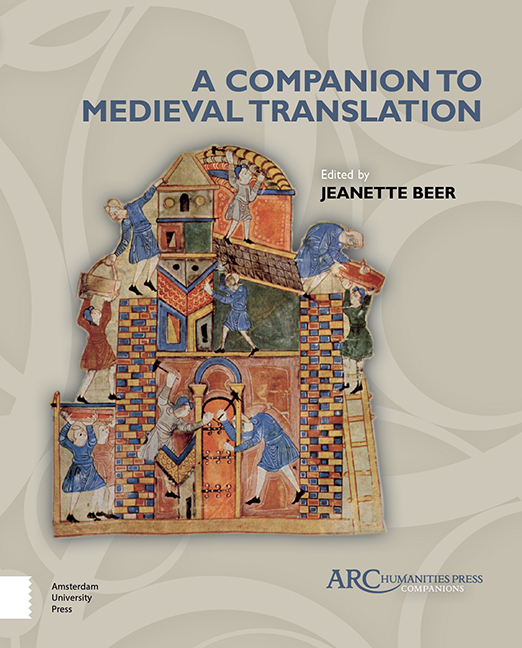Book contents
- Frontmatter
- Contents
- Acknowledgements
- Introduction
- Chapter 1 The European Psalms in Translation
- Chapter 2 The Old French Bible
- Chapter 3 Middle English Religious Translation
- Chapter 4 Bible Translation and Controversy in Late Medieval England
- Chapter 5 Medieval Convent Drama: Translating Scripture and Transforming the Liturgy
- Chapter 6 Translating Romance in Medieval Norway: Marie de France and Strengleikar
- Chapter 7 Christine de Pizan, Translator and Translation Critic
- Chapter 8 Translation, Authority, and the Valorization of the Vernacular
- Chapter 9 Vernacular Translation in Medieval Italy: volgarizzamento
- Chapter 10 Dante and Translation
- Chapter 11 Chaucer and Translation
- Chapter 12 Alchemy and Translation
- Chapter 13 Scientific Translation: A Modern Editor’s Perspectiv
- Chapter 14 Modern Theoretical Approaches to Medieval Translation
- Chapter 15 Observations on Translation by a Thirteenth-Century Maître: Li Fet des Romains
- Epilogue. Observations on Translation by the Oxford Professor of Poetry: Pearl
- General Bibliography
- Appendix
- Index
Chapter 3 - Middle English Religious Translation
Published online by Cambridge University Press: 20 November 2020
- Frontmatter
- Contents
- Acknowledgements
- Introduction
- Chapter 1 The European Psalms in Translation
- Chapter 2 The Old French Bible
- Chapter 3 Middle English Religious Translation
- Chapter 4 Bible Translation and Controversy in Late Medieval England
- Chapter 5 Medieval Convent Drama: Translating Scripture and Transforming the Liturgy
- Chapter 6 Translating Romance in Medieval Norway: Marie de France and Strengleikar
- Chapter 7 Christine de Pizan, Translator and Translation Critic
- Chapter 8 Translation, Authority, and the Valorization of the Vernacular
- Chapter 9 Vernacular Translation in Medieval Italy: volgarizzamento
- Chapter 10 Dante and Translation
- Chapter 11 Chaucer and Translation
- Chapter 12 Alchemy and Translation
- Chapter 13 Scientific Translation: A Modern Editor’s Perspectiv
- Chapter 14 Modern Theoretical Approaches to Medieval Translation
- Chapter 15 Observations on Translation by a Thirteenth-Century Maître: Li Fet des Romains
- Epilogue. Observations on Translation by the Oxford Professor of Poetry: Pearl
- General Bibliography
- Appendix
- Index
Summary
In order to give an idea of the repertoire of sacred translating in late medieval England, this chapter examines the attitudes, procedures, and ambitions of translators in a representative and revealing sample of texts, namely the Ormulum; the Psalter commentary-translation of Richard Rolle; the Early Version and the Later Version of the Wycliffite Bible; the Glossed Gospels; the Stanzaic Life of Christ; Nicholas Love's Mirror of the Blessed Life of Jesus Christ; A Mirror to Devout People, and Osbern Bokenham's Legendys of Hooly Wummen.
Translators of Middle English religious works were obliged to communicate in the vernacular the sententia (the teaching/ significance) of their sources for the benefit of their readers and hearers. The most intimidating task they might face was translating holy Scripture, whose ultimate author was God himself. Whether they translated the Bible, saints’ lives, visionary revelations, biblical commentaries, liturgical or pastoral works, translators did so under the constraint, permission, and licence of the Church and its traditions of doctrine and interpretation. Biblical and ecclesiastical auctoritas was complemented, however, by another principle, frequently advertised in prologues: that of a good and diligent conscience on the part of the translator. Exculpation through good intent was a powerful resource for the sincere textual labourer. After all, bad faith and impurity of motive (such as intellectual pride) were sins, whereas mere linguistic bungling and want of literary talent were not. The Carthusian maker of a fifteenth-century life of Christ, A Mirror to Devout People, expressed this principle crisply with the plea “ho so cunne not escuse the werke lete hym escuse the entent” (whoever cannot excuse the work, let him excuse the intent).
What general conception, then, did medieval religious translators have of their craft? We need look no further than the great dictionary of the age, the Catholicon of Joannes Januensis: “translatio est expositio sententie per aliam linguam” (translation is the exposition of meaning/ teaching through/ by another language). Translation, then, was akin to commentary or exposition: not only were the linguistic unpacking and reinscription of the source part of the skill-set of the translator, so too was the interpretative elaboration of its contents.
- Type
- Chapter
- Information
- Companion to Medieval Translation , pp. 37 - 50Publisher: Amsterdam University PressPrint publication year: 2019



